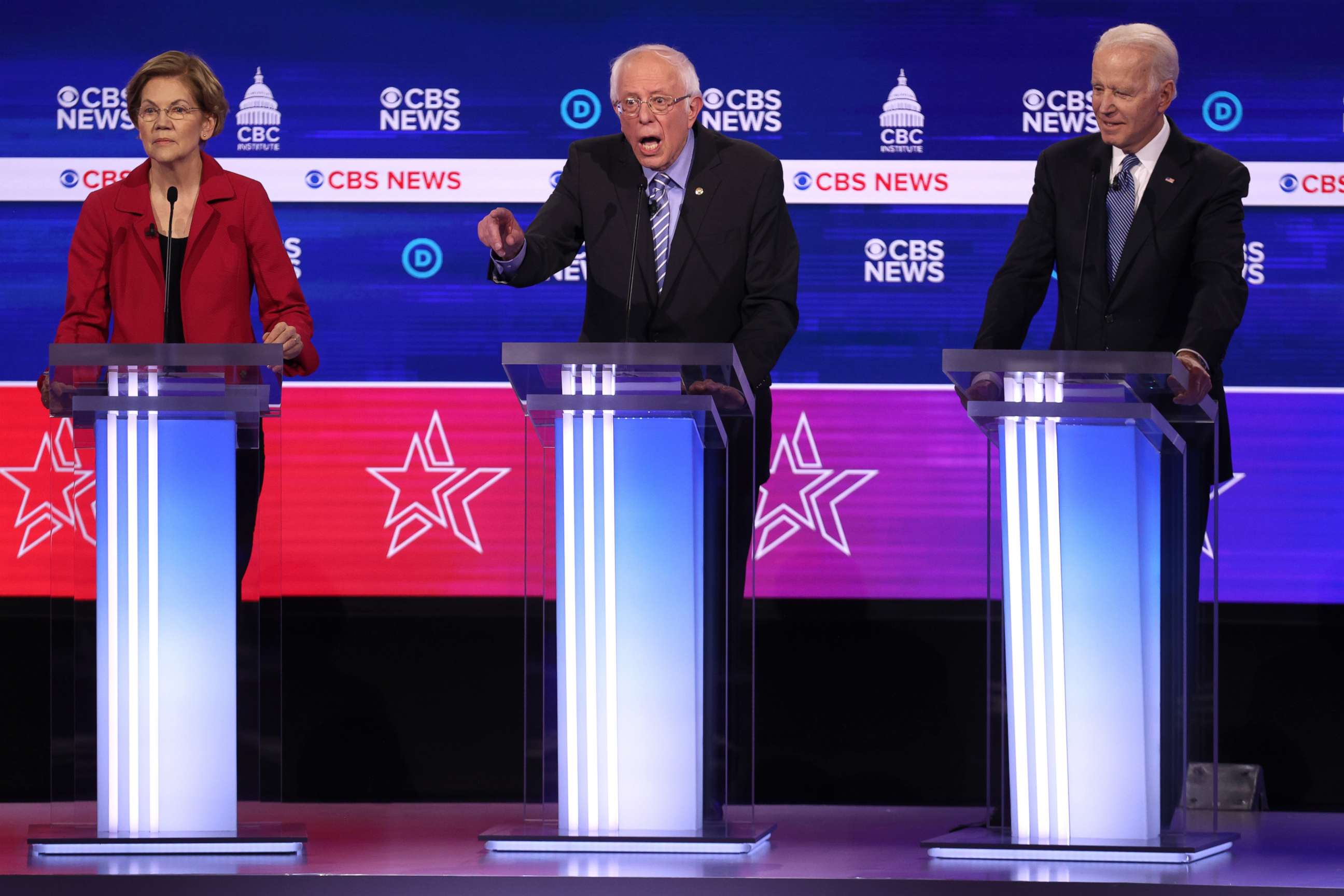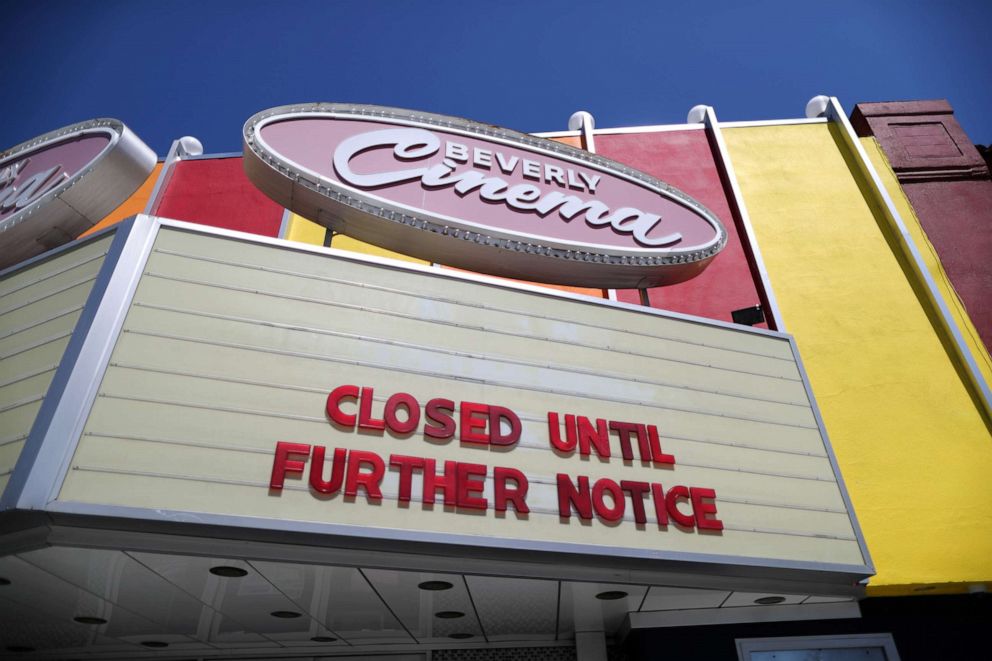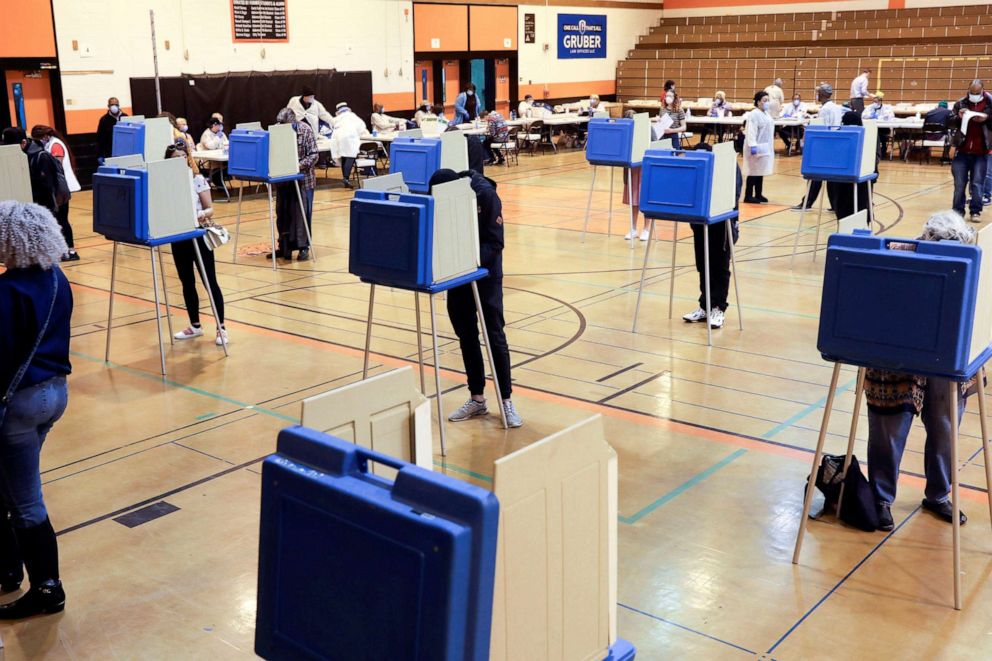The Note: Biden still watching his left, party unity aside
With concessions on some issues, Biden’s camp signals a willingness to engage.
The TAKE with Rick Klein
Former Vice President Joe Biden's theory of the Democratic Party was proven broadly accurate, and it turned out he didn't need to own the left to lay claim to the presidential nomination.
But even as he has secured a final wave of major endorsements, and even with the national crisis surrounding the coronavirus pandemic melting away intraparty splits, the Biden campaign is mindful of forces in the party's progressive wing -- with good reason.
Both Sens. Bernie Sanders and Elizabeth Warren offered their backing this week with vows to continue to press Biden on matters of policy. With early concessions on health care and student debt, Biden's camp is signaling a willingness to engage.
"He's not too afraid or too proud to be persuaded," Warren said in her endorsement video released Wednesday.

Pressures from the left are likely to be played out in Biden's vice-presidential search, which is already playing with an unusual amount of public lobbying for the job. Warren herself said Wednesday night that she would accept an offer to join Biden on the ticket.
Rep. Alexandria Ocasio-Cortez, who has not yet endorsed Biden but has made clear she will support him, is signaling that Biden's choice will be critical in bringing the party together.
"Unity isn't a feeling. It's a process, and I think that Biden can go further," Ocasio-Cortez said Wednesday on ABC's "The View."
The COVID-19 crisis appears to have brought a cleaner end to the Democratic side of the campaign than might have been anticipated. But it's worth remembering that it has also raised the stakes for those engaged in the process -- and those who didn't win won't be silenced.
The RUNDOWN with MaryAlice Parks
There are small and then there are micro businesses and it's the latter that has Congress worried right now.
The nail salons, delis and tiny retailers, with only a handful of employees and fewer connections to their banks, are at risk of being overlooked and passed by as the money allocated in the first wave of economic relief runs dry.

The roughly $350 billion Paycheck Protection Program, set up to help rescue small businesses with federally-backed forgivable loans, is expected to run out of funds soon, according to two Republican sources.
For two weeks Democrats have said the smallest business -- especially minority-owned small businesses -- were at a disadvantage.
While congressional leaders are expressing "hope" that they'll reach a deal to expand funding to the program and help more businesses with their bills, no deal is yet in sight.
The head of a major banking industry trade group told reporters they are now seeking guidance from the Department of Treasury and the Small Business Administration, about what to do once the spigot is temporarily shut off.
Will they have to start the entire application process over if a business owner was in the pipeline, but not yet approved?
In a statement, Treasury Secretary Steven Mnuchin and SBA Administrator Jovita Carranza urged Congress to appropriate additional money because, "by law, the SBA will not be able to issue new loan approvals once the programs experience a lapse in appropriations."
The TIP with Kendall Karson
Wisconsin's election may be over, but the very partisan debacle that culminated in their dangerous experiment triggered a national debate about voting by mail ahead of November.
While both parties mine through the results, looking for cues to form a playbook to win the crucial battleground in the fall, election officials and state leaders seeking to shield voters from the threat of the coronavirus should look to Wisconsin's successes and failures in the lead up to the early April contest to draw broader lessons for how to prepare for an election amid this new normal.

More than 1.5 million voters showed up -- by mail and in-person -- for the election, surpassing 2008's turnout total but still falling short of 2016's historic mark. Of that total, nearly three in four voters cast their ballots absentee, according to the most recent data provided by the state elections commission, a historic feat for the state. Still, thousands of voters chose to stand in long lines and vote in-person as a deadly and highly contagious outbreak raged -- a warning for other states with elections still to come.
Within the state's largest county, the city of Milwaukee, where the number of polling stations shrank from about 180 to only five, 18,803 voters cast their ballots in-person, putting an average of nearly 4,000 voters at each site. As more states turn to mail voting options to avoid Wisconsin's fate, it's clear even a robust mail voting system might not be enough to thwart the perils of a global pandemic.
THE PLAYLIST
ABC News' "Start Here" Podcast. Thursday morning's episode features ABC News Chief White House correspondent Jonathan Karl, who tells us how President Donald Trump is planning to direct states to reopen their economies. Then, ABC News Senior National correspondent Terry Moran examines the claims made against the president about how the World Health Organization initially handled the coronavirus outbreak.http://apple.co/2HPocUL
ABC News' "Powerhouse Politics" Podcast. Despite being the first state forced to confront the coronavirus outbreak in the U.S., Washington Gov. Jay Inslee said Wednesday on that reopening there is still "quite a ways away," even though mitigation measures, such as social distancing, are having a "beneficial impact" at stopping the virus' spread. http://apple.co/2vje5Oc
WHAT YOU NEED TO KNOW TODAY
Download the ABC News app and select "The Note" as an item of interest to receive the day's sharpest political analysis.
The Note is a daily ABC News feature that highlights the day's top stories in politics. Please check back tomorrow for the latest.



